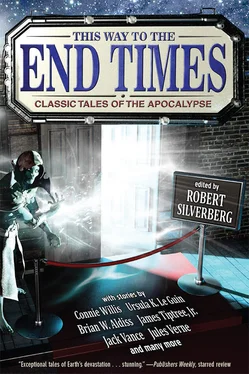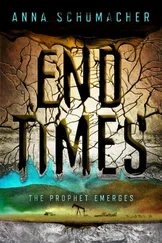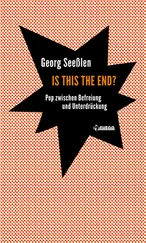The two other Anglo-Saxons were Williamson, proprietor of an important fishery in Rosario, and Rowling, an enterprising young man who raised early fruits and vegetables in the outskirts of the city and was in the way of reaping a substantial fortune.
As for the last guest, he was Senor Mendoza, President of the Rosario Tribunal, an estimable gentleman, a cultivated mind, of unquestioned integrity on the bench.
NOTHING WORTH RECORDING OCCURRED UNTIL we arrived al the end of the meal. I have forgotten what words we had exchanged up to this point. But, on the contrary, I well remember what was said over our cigars.
Not that our remarks had in themselves any particular importance; it was the brutal commentary on them, shortly to be made, that could not fail to give them a certain piquancy, and they have consequently stayed fresh in my memory.
We had entered into a discussion of the marvelous achievements of man. At a certain point, Doctor Bathurst said:
“It is a fact that if Adam” (naturally, as an Anglo-Saxon he pronounced it Eddem) “and Eve” (he said Eeve, you understand) “should return to earth, they’d be jolly well astonished.”
That was the origin of the discussion. Being a fervent Darwinist, a convinced partisan of natural selection, Moreno asked Bathurst in an ironic tone if he seriously believed in the legend of the Earthly Paradise. Bathurst answered that at least he believed in God, and that, since the existence of Adam and Eve is affirmed in the Bible, it was not his privilege to dispute it. Moreno replied that he believed in God at least as strongly as did his adversary, but that the first man and the first woman could very well be only myths—symbols, rather—and that consequently there was nothing impious in supposing the pair to represent the breath of life introduced by the Creator into the first cell from which all others had developed. Bathurst retorted that such an interpretation was specious, and that, as far as he was concerned, he held it more flattering to be the direct work of the Lord than to have descended through the medium of more or less monkey-like primates.
The discussion, I felt, was about to grow heated; but it was suddenly dropped, for the two adversaries by chance found themselves in an area of agreement. (After all, that was how their arguments ordinarily ended.)
This time, reverting to their earlier theme, the two antagonists concurred in admiring the high culture attained by humanity, whatever had been its origin; and proudly they began to enumerate its conquests. Everything passed in review. Bathurst extolled chemistry, which was advanced to such a degree of perfection that it was likely to disappear by merging with physics to form a single science, primarily concerned with studying the energy inherent in matter. Moreno delivered the eulogy of medicine and surgery, thanks to which, he said, the nature of life processes had been probed to the core, with consequent discoveries that afforded hope, in the near future, of assuring the immortality of animal organisms. After which, the two joined in praising the wonderful advances of astronomy. Were we not in communication, if not with the stars, at least with eight of the planets in the solar system?
WHEN THE TWO ENTHUSIASTS PAUSED to catch their breath, my other guests and I seized the opportunity to put in a word in our turn, and we went into the vast field of practical inventions that had so profoundly modified our way of life. We toasted the rail-express and steamships that were still best adapted for the transport of heavy or bulky merchandise; the economical airplanes used by travelers who had time to spare; and the pneumatic or electro-ionic tubes, streaking through all continents and beneath the seas, indispensible for people in a hurry. We toasted the innumerable machines, increasingly ingenious, that could perform the work of hundreds of men. We toasted the new printing technique, and our ability to photograph not only light and color, but likewise sound, heat, and all the other waves vibrating in the ether. But above all we toasted electricity, the agent that was so versatile and controllable, the essence and properties of which were now so perfectly understood that, dispensing with wires, we could use it to run all kinds of machines, navigate any vessel, marine, submarine, or aerial, and write, see, or speak—and at whatever distance we pleased.
In short, we joined in composing a genuine dithyramb to Progress, and I confess to contributing my share. We were agreed on the point that humanity had reached an intellectual peak unknown before our era, and that we were authorized to believe in our eventual victory over nature.
“And yet,” said Judge Mendoza in his little piping voice, profiting by the moment of silence following this last conclusion, “I’ve heard it said that people long gone, of whom we can find few or no traces, enjoyed in their time a civilization equivalent to ours.”
“And who were they?” we queried in one voice.
“Why . . . the Babylonians, for example.”
There was a burst of laughter. To venture a comparison between the Babylonians and modern men!
“The Egyptians,” continued Don Mendoza calmly.
More laughter.
“Take the people of Atlantis, too,” went on the Judge. “They are legendary, but perhaps only because of our ignorance. Why not add that an infinity of other peoples, preceding the Atlanteans themselves, and quite unknown to us, may have succeeded in rising and prospering—only to die out completely!”
Since Don Mendoza was persistent in his paradox, the rest of us, in order not to offend him, pretended to take him seriously.
“Look here, my dear President,” put in Moreno, using the tone one is careful to adopt when trying to make a child listen to reason, “you do not want to maintain, I imagine, that any of those ancient peoples could be compared to us? In the moral order, I admit, they might have raised themselves to an equal level of culture, but in the material order—”
“Why not?” objected Don Mendoza.
“Because,” Bathurst hastened to explain, “the unique thing about our inventions is that they are immediately spread all over the earth: the disappearance of any one people, or even a great number of peoples, as advanced as we are, would therefore leave intact the total accomplishment. For the present human effort to be lost, it would be necessary for all humanity to disappear at once. And is that, I ask you, an admissible possibility?”
EVEN WHILE HE WAS SPEAKING, causes and effects were continuing to succeed each other and interact throughout the universe, and in less than one minute after Doctor Bathurst’s question, the resultant of certain of those causes and effects was going to justify only too well Mendoza’s skepticism. But of course we were quite unsuspecting, and the discussion proceeded quietly, some of us leaning back in our chairs, others with elbows on the table, all turning sympathetic eyes toward Mendoza, who was overwhelmed, we supposed, by Bathurst’s argument.
“Let me say first of all,” said the Judge, unruffled, “that it is to be believed that the Earth in the old days had far fewer inhabitants than today, living in more isolated communities, so that one people could very well possess universal knowledge and keep it to themselves. And next, I see nothing absurd in admitting the possibility that the entire surface of the globe might be convulsed all in one moment.”
“Oh, come now!” we all cried together.
And it was at this precise instant that the cataclysm struck!
We were uttering that “Oh, come now!” when a fearful uproar arose. The ground trembled and sank under our feet. The villa rocked on its foundations.
Impelled by inexpressible terror, we collided and jostled as we rushed out into the garden.
Читать дальше











